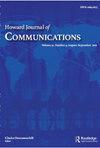Alba the Undocumented: Immigration Law and Citizenship Excess in Jane the Virgin
IF 0.8
Q3 COMMUNICATION
引用次数: 1
Abstract
Abstract The CW’s Jane the Virgin (2014–2019; JTV) is a critically acclaimed, 100-episode US broadcast network television program that featured Latina characters and actors. The series was broadcast through two presidential administrations, Obama and Trump, which marked seemingly different approaches to immigration policy and enforcement. Although other shows have featured undocumented characters, such as Ugly Betty (2006–2010) and the remake One Day At A Time (2017–2019) among others, none (other than JTV) have illustrated the three juridical status changes required to complete an undocumented immigrant’s journey to naturalized citizenship. This article addresses three key moments in Alba Villanueva’s journey to citizenship via a critical textual analysis of select episodes across five seasons through Hector Amaya’s theory of citizenship excess. Alba’s journey to citizenship becomes public pedagogy for understanding the role of immigration law in society. With its push for #IMMIGRATIONREFORM, JTV also draws on the “marriage-for-a-green card” trope through Alba’s marriage to an undocumented Mexican immigrant to subvert and repurpose film and television’s use of this stereotype. This same narrative illustrates Alba’s internalization of the trappings of citizenship including how citizenship excess always distinguishes between citizens and non-citizens to justify legalized inequality.无证的阿尔芭:《处女简》中的移民法和公民身份过剩
CW美剧《处女情缘》(Jane The Virgin, 2014-2019);JTV)是一部广受好评的100集美国广播网络电视节目,主要由拉丁裔角色和演员出演。该剧在奥巴马和特朗普两届政府期间播出,这两届政府在移民政策和执法方面表现出看似不同的态度。尽管其他电视剧中也出现了非法移民角色,比如《丑女贝蒂》(2006-2010)和翻拍版《一天在一起》(2017-2019)等,但除了JTV之外,没有一部剧展示了完成非法移民入籍公民身份所需的三次法律地位变化。本文通过对五季中精选剧集的批判性文本分析,通过Hector Amaya的公民过度理论,阐述了Alba Villanueva公民之旅中的三个关键时刻。阿尔芭的公民之旅成为理解移民法在社会中的作用的公共教育。在推动#移民改革的同时,JTV还通过阿尔芭与一名墨西哥非法移民的婚姻,利用“为绿卡而结婚”的比喻,颠覆并重新定义了电影和电视对这一刻板印象的使用。同样的叙述说明了阿尔巴对公民身份的内化,包括公民身份的过剩如何总是区分公民和非公民,以证明合法的不平等。
本文章由计算机程序翻译,如有差异,请以英文原文为准。
求助全文
约1分钟内获得全文
求助全文
来源期刊

Howard Journal of Communications
COMMUNICATION-
CiteScore
2.70
自引率
10.00%
发文量
23
期刊介绍:
Culture, ethnicity, and gender influence multicultural organizations, mass media portrayals, interpersonal interaction, development campaigns, and rhetoric. Dealing with these issues, The Howard Journal of Communications, is a quarterly that examines ethnicity, gender, and culture as domestic and international communication concerns. No other scholarly journal focuses exclusively on cultural issues in communication research. Moreover, few communication journals employ such a wide variety of methodologies. Since issues of multiculturalism, multiethnicity and gender often call forth messages from persons who otherwise would be silenced, traditional methods of inquiry are supplemented by post-positivist inquiry to give voice to those who otherwise might not be heard.
 求助内容:
求助内容: 应助结果提醒方式:
应助结果提醒方式:


